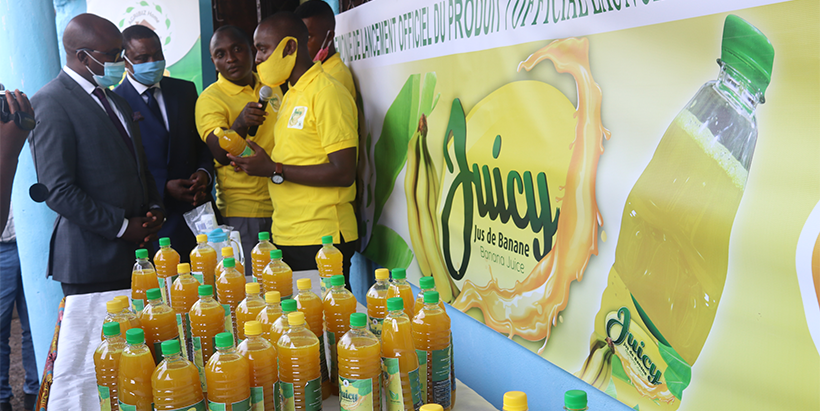
ENABLE Youth Cameroon births first start-up
On 15 June, AgriBiz Home made history as the first start-up of the ENABLE Youth Cameroon program. At a ceremony chaired by the city of Penja Divisional Officer M. Abate, the start-up unveiled “Juicy”, its branded banana-based fruit juice, to the public. Cargèle Masso, IITA-Cameroon Country Representative and Coordinator of ENABLE Youth Cameroon, also attended the historic event.

Juicy Tasting with IITA and city of Penja officials.
Twenty-four-year-old Agripreneur Tabi Priestly Gwangwa’a, the owner of AgriBiz Home, is the first to launch a personal business within the ENABLE Youth Cameroon program. Coming from the Youth Agribusiness Incubation Center (YABIC) in Dibombari, Gwangwa’a has stood out throughout his ongoing incubation cycle, as part of the first cohort of the program. He chose to set up his business in the city of Penja, to take advantage of the banana production in the region.
Gwangwa’a holds a BSc in Agribusiness from University of Buea and always had a passion for banana because of its nutritional value. Beyond the production of bananas into fruit juice and jam, Gwangwa’a also has plans to expand his enterprise to transform the whole banana plant into various products and the resulting waste into fertilizers. Only the ultimate waste will leave the company, a significant contribution to the circular economy and environmental sustainability.
In the six months preceding the launch of the “Juicy” brand, Gwangwa’a assembled a team of young people with whom he has worked tirelessly. To ensure the successful marketing of its product, AgriBiz Home is currently prospecting potential clients and negotiating with Douala-based supermarkets such as Meno and Bonus. Although he started his activity, the young Tabi has continued to work with the experts of the Program to improve his processes, obtain the necessary support for compliance with standards and regulations in the agrifood sector, and develop his market for his products.
To launch his business, Gwangwa’a obtained funding through his participation in networking activities such as the 2019 UNDP youth entrepreneurship innovation challenge in Cameroon. He became the national champion of the UNDP Challenge, for which he received a cash prize and a fully sponsored trip to attend the third edition of the Youth Connekt Africa (YCA) Summit in Kigali, Rwanda, on 9–11 October 2019.

(L-R) Enable Youth Cameroon Program Coordinator, Dr Cargèle Masso, Divisional Officer of Penja M. Abate, AgriBiz Home CEO Priestly Tabi Gwangwa’a, and the MINADER representative in Penja.
ENABLE Youth Cameroon is one of the responses of the Government of Cameroon to the problem of unemployment among young graduates in the country. The program equips young African graduates with agribusiness skills to create decent jobs in the agricultural sector and encourage young people to set up businesses and create even more employment opportunities.
In Cameroon, IITA is implementing the ENABLE Youth initiative, following an agreement with the Ministry of Agriculture and Rural Development (MINADER). Thanks to a loan from the African Development Bank (AfDB) to the Republic of Cameroon, ENABLE Youth Cameroon will incubate 1,536 young agripreneurs divided into three cohorts of 512 each and create at least 600 agribusinesses, which will generate 6,000 job opportunities for other youths.
“The ENABLE Youth Cameroon Program has played a huge role in what I am achieving today,” said Gwangwa’a, “My perception of agriculture has changed, thanks to the orientation I had during my incubation and my constant exchanges with the experts.” He credits his many teachers for the skills he has acquired to develop his business.
“Although my training is still ongoing, I distinguish myself daily by my approach of adding value to the production of bananas. It is important for me to integrate new technologies to increase my production, sales, and marketing. I will always be an ambassador of ENABLE Youth Cameroon and I encourage my comrades to work with a lot of resilience to finalize their business plans,” he concluded.
